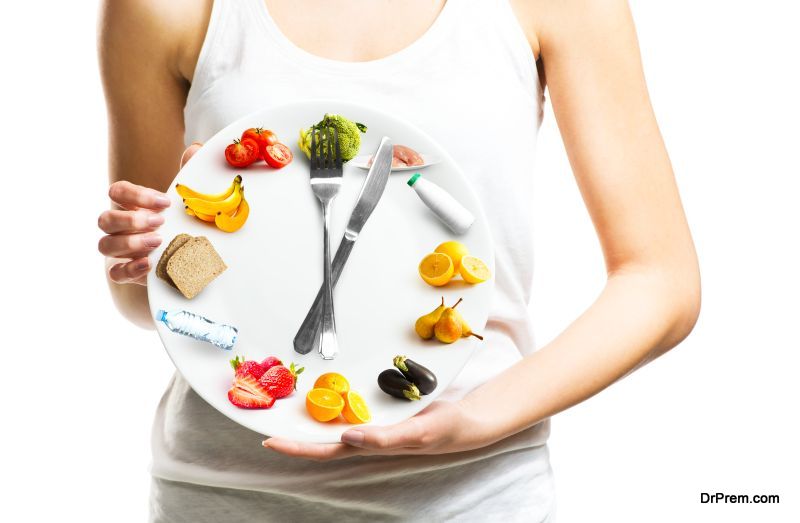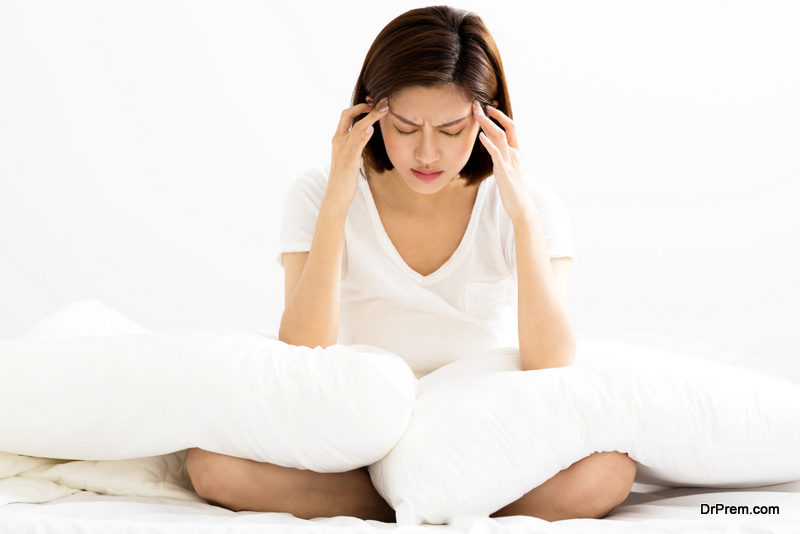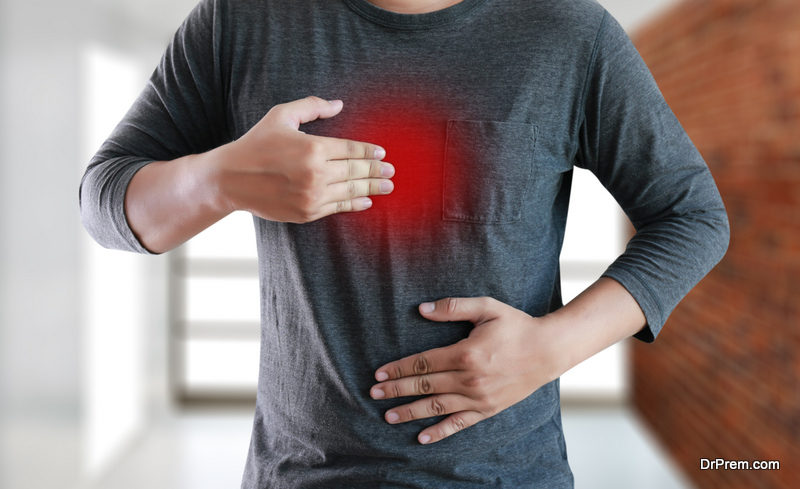Have you been experiencing painful gas, bloating or overall discomfort? If so, you’re not alone. According to the American Nutrition Association, over 70 million Americans suffer from some form of digestive issues. While many of these cases are due to underlying medical conditions, some are purely attributed to a poor diet. Are you eating enough probiotics, vegetables, and fiber? Is your diet lacking in key nutrients? Keep reading to discover nine signs that your diet is in serious trouble and ways to make a positive change.
1. Bad Breath

Bad breath isn’t just caused by poor dental hygiene. The foods you consume (and how much) can directly affect how fresh and clean your breath smells (or how bad!). This reaction is often due to eating a low-carb diet. Those individuals who follow the Keto diet are much more likely to experience this unpleasant side-effect. Ketosis is a metabolic process in the body where you burn stored fat instead of sugar (glucose) for energy. Glucose is found in any foods containing sugar, primarily carbohydrates. Ketosis causes a build-up of acids in the mouth, often causing bad breath. One way to fix this is to make sure you’re eating adequate, healthy carbs, to boost energy levels. Acid reflux is another digestive issue that may result in bad breath, since it too causes a build-up of acid in the mouth and throat.
2. Constipation
 Pressure, bloating, and extreme discomfort — these are all tell tale signs of constipation. Constipation is defined by either difficulty passing a bowel movement or the inability to do so at all. Ideally, you should pass a bowel movement once a day. But “normal” bowel movements can range from several times a day to several times a week, depending on the person. If you’re experiencing an unusually long period of time without a bowel movement, you may be constipated. Over the counter laxatives and stool softeners can help. But to prevent the recurrence of this issue, it’s important to identify the root of the problem. Constipation is most often caused by lack of fiber in your diet. Fiber helps your body absorb nutrients but also eases food as it works through the digestive system and gives bulk to your stool. Without it, you’ll struggle to go and if you do, your stool will be hard and painful to pass.
Pressure, bloating, and extreme discomfort — these are all tell tale signs of constipation. Constipation is defined by either difficulty passing a bowel movement or the inability to do so at all. Ideally, you should pass a bowel movement once a day. But “normal” bowel movements can range from several times a day to several times a week, depending on the person. If you’re experiencing an unusually long period of time without a bowel movement, you may be constipated. Over the counter laxatives and stool softeners can help. But to prevent the recurrence of this issue, it’s important to identify the root of the problem. Constipation is most often caused by lack of fiber in your diet. Fiber helps your body absorb nutrients but also eases food as it works through the digestive system and gives bulk to your stool. Without it, you’ll struggle to go and if you do, your stool will be hard and painful to pass.
3. Diarrhea

On the other side of the spectrum from constipation, diarrhea occurs when you have frequent, loose bowel movements. Most times these movements are accompanied by painful cramps, dehydration, and anal irritation. Two main causes of diarrhea are coeliac disease and irritable bowel syndrome (IBS). Celiac disease is a hypersensitivity to gluten. Gluten is found mostly in wheat, rye, and barley products. The primary symptoms of this disease are weight loss, abdominal pain, bloating, and persistent diarrhea. The easiest way to treat celiac disease is to remove all gluten from your diet. IBS, on the other hand, has no known cause although many doctors believe a bacterial infection is to blame IBS symptoms include changes in bowel movements, food intolerance, and diarrhea. To treat IBS, cut out fatty foods, try eating small meals, and monitor your fiber intake.
4. Fatigue
 Most Americans are perpetually tired. Working long hours, stress, and poor sleep habits can all lead to excess fatigue. But so can a poor diet. Believe it or not, the main cause of fatigue is a diet too high in sugar. This may seem strange since most people associate sugar with a “sugar high”. While consuming high-sugar foods does give you an initial burst of energy, it’s the crash you experience after that leaves you feeling weak and sluggish. This “crash” is a dip in your blood sugar levels following the initial rise in insulin. The best way to avoid this yo-yo effect is to ingest healthy snacks low in sugar like nuts and bananas. Another natural phenomenon is the sleepy effects caused by tryptophanT — an ingredient most commonly found in turkey. This amino acid reacts with other chemicals in your brain that make you tired.
Most Americans are perpetually tired. Working long hours, stress, and poor sleep habits can all lead to excess fatigue. But so can a poor diet. Believe it or not, the main cause of fatigue is a diet too high in sugar. This may seem strange since most people associate sugar with a “sugar high”. While consuming high-sugar foods does give you an initial burst of energy, it’s the crash you experience after that leaves you feeling weak and sluggish. This “crash” is a dip in your blood sugar levels following the initial rise in insulin. The best way to avoid this yo-yo effect is to ingest healthy snacks low in sugar like nuts and bananas. Another natural phenomenon is the sleepy effects caused by tryptophanT — an ingredient most commonly found in turkey. This amino acid reacts with other chemicals in your brain that make you tired.
5. Heartburn
 That unmistakable feeling of burning in your chest and throat. Particles of food coming up your esophagus each time you burp. A watering mouth. These are all signs of heartburn And while it doesn’t seem serious, if ignored for too long, this digestive issue can cause serious health complications. Heartburn is actually a system of gastro esophageal reflux disease (GERD). When acid reflux from the stomach backs up into your throat and esophagus, it causes burning and discomfort. Some foods cause heartburn more than others. Here are just a few foods that are commonly associated with acid reflux:
That unmistakable feeling of burning in your chest and throat. Particles of food coming up your esophagus each time you burp. A watering mouth. These are all signs of heartburn And while it doesn’t seem serious, if ignored for too long, this digestive issue can cause serious health complications. Heartburn is actually a system of gastro esophageal reflux disease (GERD). When acid reflux from the stomach backs up into your throat and esophagus, it causes burning and discomfort. Some foods cause heartburn more than others. Here are just a few foods that are commonly associated with acid reflux:
- Citrus fruits
- Spicy foods
- Chocolate
- Alcohol
- Tomatoes/Tomato sauce
- Coffee
While you don’t need to completely eliminate these foods from your diet, you should limit them or take over the counter heartburn medications to avoid an attack. Looking to improve your overall gut health? A human gut microbiome test can help!
6. Urge to Urinate
 Shockingly, not all signs that you need to change your diet originate from the stomach. If you’re experiencing a frequent urge to urinate, it could be a sign that you’re extremely dehydrated. Hydration is an important part of overall body function. Without it, you’re left feeling fatigued, disoriented, and even dizzy. But how can a lack of water make you urinate more? While an increase in water intake will make you pee more often, your body also signals you to hit the bathroom when your urine is too concentrated. Signs of concentrated urine include a darker yellow hue and foul odor. If this issue isn’t addressed, it could lead to bladder and kidney complications. As your hydration improves, you’ll notice the color of your urine becoming lighter. Not a fan of drinking plain water? You can hydrate other ways too. Unsweetened teas and even coffee count toward your daily liquid intake (but beware, coffee is a natural diuretic that will also increase urination). Try consuming fruits that contain high levels of water like watermelon, pineapple, peaches, berries, and oranges.
Shockingly, not all signs that you need to change your diet originate from the stomach. If you’re experiencing a frequent urge to urinate, it could be a sign that you’re extremely dehydrated. Hydration is an important part of overall body function. Without it, you’re left feeling fatigued, disoriented, and even dizzy. But how can a lack of water make you urinate more? While an increase in water intake will make you pee more often, your body also signals you to hit the bathroom when your urine is too concentrated. Signs of concentrated urine include a darker yellow hue and foul odor. If this issue isn’t addressed, it could lead to bladder and kidney complications. As your hydration improves, you’ll notice the color of your urine becoming lighter. Not a fan of drinking plain water? You can hydrate other ways too. Unsweetened teas and even coffee count toward your daily liquid intake (but beware, coffee is a natural diuretic that will also increase urination). Try consuming fruits that contain high levels of water like watermelon, pineapple, peaches, berries, and oranges.
Eating a well-balanced diet full of color and variety is important to maintain overall health and wellness. But when it comes to your digestive health, there are certain major changes you should consider. If you’re feeling any type of pain or discomfort, these tips might help. If your condition persists, you may need to seek medical attention.
Article Submitted By Community Writer




